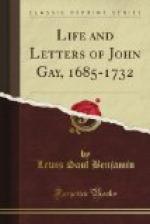“As I knew every one of these charges was in every point absolutely false and without the least grounds, at first I was not at all affected by them; but when I found they were still insisted upon, and that particular passages, which were not in the play, were quoted, and propagated to support what had been suggested, I could no longer bear to lie under those false accusations; so, by printing it, I have submitted and given up all present views of profit which might accrue from the stage; which undoubtedly will be some satisfaction to the worthy gentlemen who have treated me with so much candour and humanity, and represented me in such favourable colours.
“But as I am conscious to myself, that my only intention was to lash, in general, the reigning of fashionable vices, and to recommend and set virtue in as amiable light as I could; to justify and vindicate my own character, I thought myself obliged to print the Opera without delay, in the manner I have done.
“As the play was principally designed for representation, I hope, when it is read, it will be considered in that light; and when all that hath been said against it shall appear to be entirely misunderstood or misrepresented; if, some time hence, it should be permitted to appear on the stage, I think it necessary to acquaint the public that, as far as a contract of this kind can be binding, I am engaged to Mr. Rich to have it represented upon his theatre.”
* * * * *
It cannot be denied that there was adequate ground for the Lord Chamberlain’s veto. In “The Beggar’s Opera” Gay had beyond all question lampooned Walpole, and in “Polly” he returned to the attack, there being no doubt that in the opening scene, Ducat, the West Indian planter, was intended for the Minister. The production might well have led to disturbances if both political parties had been represented at the first performance. Walpole was the least vindictive of men, as witness his generous attitude towards Sunderland and the other ministers involved in the scandal of the South Sea “Bubble,” but he may well have thought that Gay was going too far. Gay himself was harmless, but, as Walpole knew, the author, either consciously or unconsciously, was acting for the Opposition party; and Walpole, when he thought it worth while, had a short and effective way with his political enemies.
The prohibition being largely an affair of party, or at least being so regarded, a battle royal ensued. “Polly” could not be performed in public, but, there being no censorship of books, it could be printed. Gay’s friends, therefore, decided that the Opera should be published by subscription. To a man and a woman the Opposition rallied round the author. The Duchess of Queensberry “touted” for him everywhere, even at Court. The King at a Drawing-room asked what she was doing. “What must be agreeable, I am sure,” she replied, “to anyone so humane as your Majesty, for it




